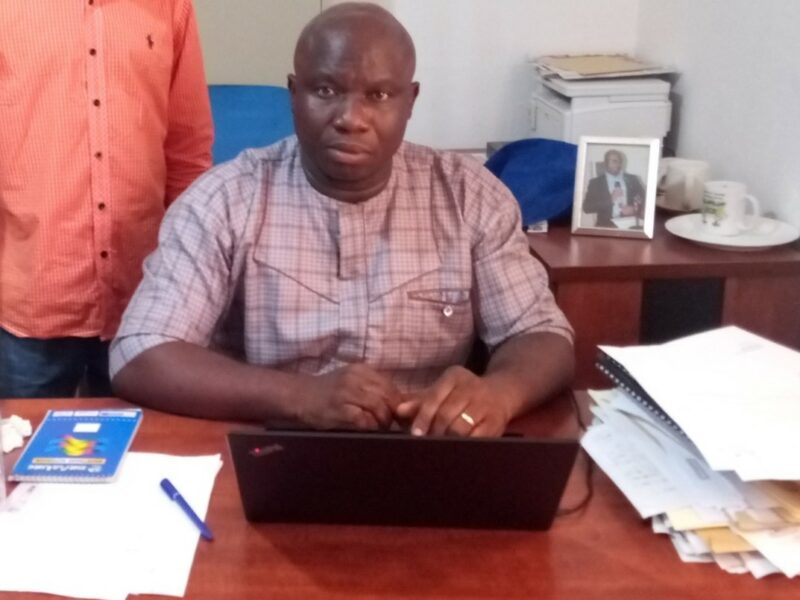Editayo grabs exclusive with Jamesina King of Human Rights Commission
‘We have discrimination that cuts across a lot of our laws…’ – Jamesina King.
There has been a debate both locally and internationally on who or what should determine a Sierra Leonean citizens following an outburst from popular business enterprenuer Nasser Ayoub who was born here and claimed that he has suffered discrimination since birth simply because of his skin colour. Editayo George Temple, President for Journalist for Attitudinal Change (JABC) caught up with Jamesina King of the Human Rights Commission at her office in Freetown. Below is what King has to say on perhaps the most discussed subject.
Our organisation has been looking at citizenship and naturalisation by extension which has sparked a wider debate among Sierra Leoneans over the last few weeks. What’s your take on this subject?
One of the fundamental principles of the Human Rights Commission of Sierra Leone is the principle of non discrimination. Even the human rights treaties which Sierra Leone signed have that principle entrenched in them. We have taken most of those principles within the bill of rights in our constitution. Unfortunately, for us we are in a country wherein we have inherited a lot of these archaic laws, or laws that do not serve us currently, which they themselves are discriminatory. We have discrimination that cuts across in a lot of our laws, for example even though the constitution says all individuals are equal, it also shields to allow discriminatory provisions to apply and that is why we are talking about the citizenship act of 1973 which is discriminatory but it is also legal.
In relation to this 1973 law which was amended in 2006, I don’t know which area has made improvements?
Two improvements were made in the 1973 law which was amended in 2006, i.e., the amended law now allows for dual citizenship which we never had before and also it removes discrimination on the basis of gender. Before 2006 a Sierra Leonean woman was unable to give citizenship to her children but with the 2006 law you are able to pass on citizenship to your grandchildren which is one good thing but it still retains the discriminatory position on the issue of race which states that one of your parents must be a negro of African descent.
This ‘Negro’ of African descent is a bone of contention for most people who where born here, including Lebanese, Indians, and other nationals, but are yet to gain their full citizenship. Some are even supporting their claim of discrimination by making reference to the Hollywood actor Isaiah Washington who was awarded a citizenship after tracing his roost to Sierra Leone whilst some of them who were born here are yet to gain anything?
Isaiah Washington is a black man right? He is a Negro of African descent. The 1973 laws do not stop Lebanese and others from getting their citizenship. They are entitled to citizenship by naturalisation. It means you must have settled here for at least 15 year or so but the problem with that is your rights are limited compared to those citizens who they describe as ‘Negro’ African decent who were born here. With the citizenship by naturalisation you can’t aspire for certain positions, you can’t serve in certain public offices, so they feel they are second class. Even the problem with naturalisation, for a very long time people have not been able to naturalise. The administrative process for naturalisation has been stalled. From 1996 to 2006 I don’t think we’ve had anyone naturalise during those 10 years. So that is a further problem with the law and even its application. Imagine we have laws that would give rights but people can’t enjoy those rights simply because we have not set up the machinery or we have stopped the machinery that allows them to have these rights. Let us also remember that that these laws are inherited, they have been with us for a very long time and I can understand why as I say these people feel aggrieved but at the same time we also need to have a national dialogue on this issue.
When you talk to some people they will tell you that these people have not been treating our people fairly. We’ve had some of them taking our people to Lebanon without taking good care of them and lots of other issues, but that does not stop us from giving them their citizenship.
We must strengthen the rule of law; if these people break the law, they should be arrested and face the full penalty of the law just like any other Sierra Leonean. It is not a question of denying them their citizenship because you still have them with you so if you claim they are doing all this evil, this evil will still continue. I think we have to divorce the issue, we have to demand loyalty, we demand that if they are given citizenship they will be good and faithful citizens to this country and that they will contribute towards the development of Sierra Leone.
By Editayo George Temple. Freetown
Stay with Sierra Express Media, for your trusted place in news!
© 2010, https:. All rights reserved.







Foday Bangura
/
God bless you Jamesina King, you could not have said it any better. It is imperative that we have a NATIONAL DIALOGUE on this issue before changing any citizenship laws. Even Jamesina King is fair enough to admit that the most of the non-negroes settling in Sierra Leone have not treated us fairly over the decades and it has always been a source of tension between the locals and other foreigners coming down to settle in Sierra Leone particularly the Lebanese. I am sure most of you remembered what happened in Uganda between the locals and the Indian community when Idi Amin came into power.
11th September 2010